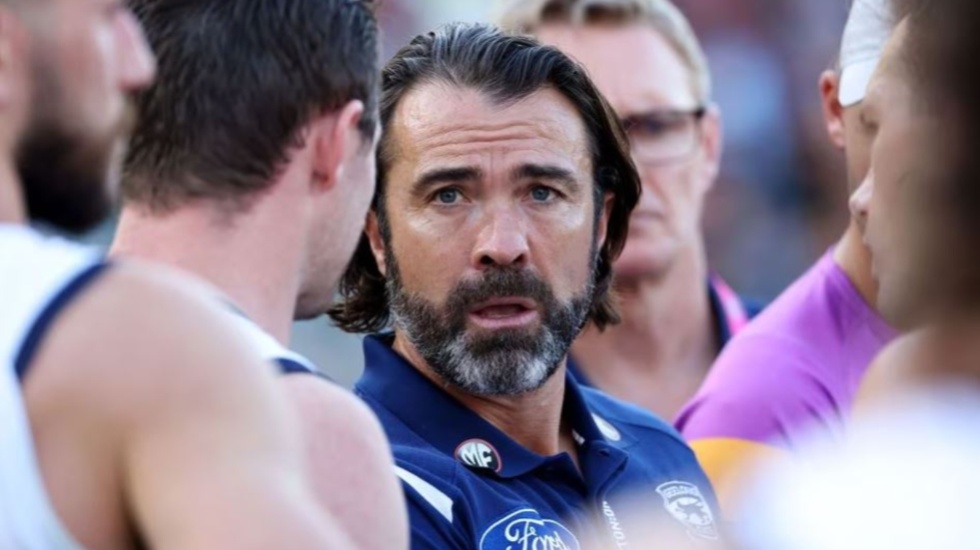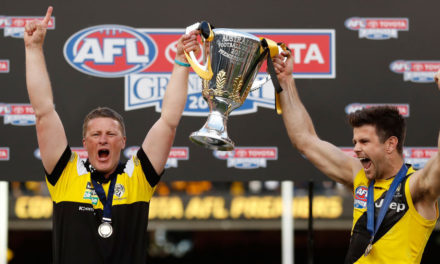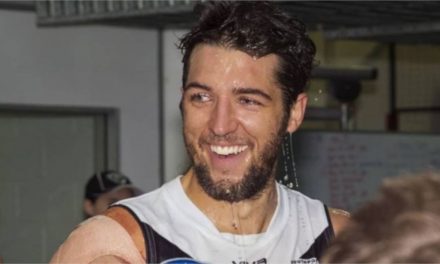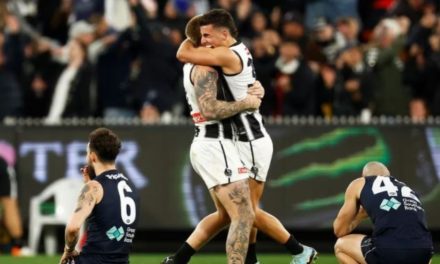Chris Scott: Geelong has been in the top eight for 240 of the 291 home and away games he has coached. Photo: AFL MEDIA
Chris Scott got a very early taste of the sorts of pressures an AFL senior coach faces. In his very first game, as a matter of fact.
It was round one 2011, and Geelong played St Kilda, its fiercest rival of the time, against whom it had won a grand final effectively by a kick then lost a qualifying final to by as little over the previous couple of seasons.
In a dour affair, it took Geelong until just 19 seconds remained to hit the front for a final time. The debutant coach leapt to his feet with a throaty roar and fist pump, his headset dislodged in the process, then realised the cameras were on him and immediately pulled himself up.
Sure enough, serious tut-tutting ensued about a coach allegedly losing his cool, loss of focus etc. That sort of micro-focus on trivialities was rubbish then, and it’s still more frequently-occurring rubbish now.
But over 13 seasons in charge of the Cats, the moment from his first game actually remains one of the very few things about which the now record-holding dual premiership coach has left himself even slightly open for criticism. And that in itself is a huge tick for a man I believe deserves to be ranked as one of the game’s greatest handful of coaches.
Scott’s 305th game as Geelong coach on Saturday, breaking the club record held by club legend Reg Hickey, is obviously a significant moment, and there will be plenty of plaudits. But I’m not sure there has been or still is enough appreciation of just how good a coach he’s been.
Maybe he’s a little less under-appreciated now than he was 12 months ago, before Geelong made it two premierships under his watch. But Scott is still not popularly seen as occupying the same rarified air accorded Alastair Clarkson, perhaps even Damien Hardwick. And I think that’s a mistake.
Clearly, the key factor in that view is premierships. Clarkson has four as a coach, Hardwick three, Scott two. But I think the weight attached to those numbers is an anachronism which in a modern football context, should be at the very least only equal alongside a coach’s winning percentage. And Scott’s, at nearly 69 per cent, given his length of tenure, is quite remarkable.
To give that number some context, consider the following. Four of Scott’s 300-plus game coaching contemporaries in Clarkson, Hardwick, Ross Lyon and John Longmire, have respective strike rates of 58, 56, 57 and 62, significantly lower. And Lyon and Longmire have one premiership between them.
Scott has a winning record head-to-head against all those contemporaries, too. It’s 12 wins, 10 losses and a draw against Longmire, 15-8 against Clarkson, 11-7 against Hardwick and 8-6 against Lyon.
Scott’s Geelong has made finals in 11 of a possible 12 seasons, grand finals in three years and preliminary finals no fewer than eight times in those 12 years. The Cats have been in the top eight for 240 of the 291 home and away games he has coached.
It’s incredible consistency of performance over a long, long period. And an AFL release on Scott’s achievements this week put that consistency in context nicely, too. Which was that even in that one year (2015) when the Cats didn’t make finals under his watch (they finished 10th), round 23 of that season was the only time where it was known at the beginning of a game that a Scott line-up couldn’t win that year’s premiership.
Perhaps it’s just the nature of the world these days, or more likely saturation coverage of the game desperately inventing reactionary takes for attention, but Scott’s incredible record has always still had its share of naysayers.
You know the lines. He inherited a great team. Geelong had a catalogue of father-son rule gifted stars. Its location has made it a more likely destination for the “go home” factor. Its home of GMHBA Stadium is a huge advantage. The Cats have kept pulling up short of flags. Blah, blah, blah.
PLEASE HELP US CONTINUE TO THRIVE BY BECOMING AN OFFICIAL FOOTYOLOGY PATRON. JUST CLICK THIS LINK.
But on the first point and last points, part of Scott’s greatness is his intelligence enough not to attempt to reinvent the wheel.
After Geelong was thrashed by Collingwood in the 2010 preliminary final, Mark Thompson departed and Scott took over, the new man could have desperately tried to put his stamp all over things. But it was subtle tweaks rather than major surgery which delivered the best possible result in that first season.
Similarly, after Geelong lost the 2019 preliminary final to Richmond, a year after having been tipped out in the first week of September by Melbourne.
The Cats had always been good at winning contests, but were becoming increasingly inefficient in their forward half and struggled to score enough from their inside 50 entries.
Scott made some gameplan changes, Geelong moving the ball more slowly, playing more keepings off and allowing the forward structure to organize better. More premium was placed on the work of small pressure forwards. And the results came.
Scott pioneered the tactical resting of senior players throughout the course of a long season, something which was the source of furious debate when it was going on in 2011 but is barely given a second thought now.
And he’s never been afraid to play the kids, and show faith in them, expediting their development, the emergence of Max Holmes into a valuable next-generation midfielder for Geelong just the latest example.
The two premierships as coach alongside his name is a record bettered by only 17 men in football history. But none of them have a winning strike rate like Scott’s. Even Jock McHale, who won seven premierships for Collingwood, or Dick Reynolds, who won four for Essendon, didn’t go at better than 66 per cent.
And what of those premierships? Without any disrespect whatsoever to the legend of those two, nor the standing of the likes of Norm Smith, Ron Barassi or Tom Hafey, they were strutting their coaching stuff in a 12-team competition in which, every week, several teams were little more than a guaranteed win for the top sides.
With the exception of his first season in charge (pre-GWS), Scott has coached in an 18-team competition where nearly every team has been at worst competitive, upsets commonplace. And so even are most premiership races that in the last decade we’ve seen a team win a flag from seventh and another two reach grand finals from fifth and sixth.
It’s harder to win premierships now, and harder to keep a side consistently in contention at the pointy end of the season. Scott does it with Geelong year after year, and now officially takes the mantle as the club’s longest-serving coach. Few would argue he’s also not only the Cats’ greatest coach, but one of the game’s.
And whether or not Scott ends up adding to that tally of two premierships, I think regardless, it’s time to acknowledge we’ve been witness to one of the best handful of coaching careers VFL/AFL football has seen.
This article first appeared at ESPN.











